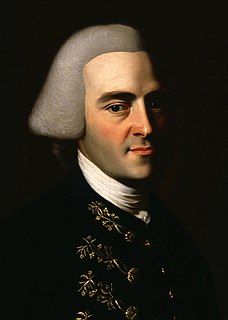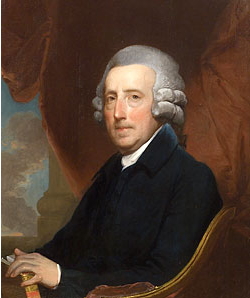Related Research Articles

John Hancock was an American merchant, statesman, and prominent Patriot of the American Revolution. He served as president of the Second Continental Congress and was the first and third Governor of the Commonwealth of Massachusetts. He is remembered for his large and stylish signature on the United States Declaration of Independence, so much so that the term "John Hancock" or "Hancock" has become a synonym in the United States for one's signature.

The Boston Massacre was a confrontation on March 5, 1770, in which British soldiers shot and killed several people while being harassed by a mob in Boston. The event was heavily publicized by leading Patriots such as Paul Revere and Samuel Adams. British troops had been stationed in the Province of Massachusetts Bay since 1768 in order to support crown-appointed officials and to enforce unpopular Parliamentary legislation.

William Dawes Jr. was one of several men who in April 1775 alerted colonial minutemen in Massachusetts of the approach of British army troops prior to the Battles of Lexington and Concord at the outset of the American Revolution. For some years, Paul Revere had the most renown for his ride of warning of this event.

Joseph Warren was an American physician who played a leading role in Patriot organizations in Boston during the early days of the American Revolution, eventually serving as President of the revolutionary Massachusetts Provincial Congress. Warren enlisted Paul Revere and William Dawes on April 18, 1775, to leave Boston and spread the alarm that the British garrison in Boston was setting out to raid the town of Concord and arrest rebel leaders John Hancock and Samuel Adams. Warren participated in the Battles of Lexington and Concord the following day, which are commonly considered to be the opening engagements of the American Revolutionary War.

Thomas Cushing III was an American lawyer, merchant, and statesman from Boston, Massachusetts. Active in Boston politics, he represented the city in the provincial assembly from 1761 to its dissolution in 1774, serving as the lower house's speaker for most of those years. Because of his role as speaker, his signature was affixed to many documents protesting British policies, leading officials in London to consider him a dangerous radical. He engaged in extended communications with Benjamin Franklin who at times lobbied on behalf of the legislature's interests in London, seeking ways to reduce the rising tensions of the American Revolution.

Dr. Benjamin Church was effectively the first Surgeon General of the United States Army, serving as the "Chief Physician & Director General" of the Medical Service of the Continental Army from July 27, 1775 to October 17, 1775. He was also active in Boston's Sons of Liberty movement in the years before the war. However, early in the American Revolution, Church was also sending secret information to General Thomas Gage, the British commander, and when one of his letters into Boston was intercepted, he was tried and convicted of "communicating with the enemy". He was jailed but eventually released, likely dying somewhere in the Caribbean Sea in 1778.

The Old South Meeting House is a historic Congregational church building located at the corner of Milk and Washington Streets in the Downtown Crossing area of Boston, Massachusetts, built in 1729. It gained fame as the organizing point for the Boston Tea Party on December 16, 1773. Five thousand or more colonists gathered at the Meeting House, the largest building in Boston at the time.

James Warren was the President of the Massachusetts Provincial Congress and a Paymaster General of the Continental Army during the American Revolutionary War, among other positions. He is also famous as the husband of Mercy Otis Warren and for his outspoken courage as an Anti-Federalist. General James Warren is sometimes confused with the two other Massachusetts Revolutionaries, the brothers Joseph Warren and John Warren, but they were not at all closely related, merely had similar names and views.

Josiah Quincy II was an American lawyer and patriot. He was a principal spokesman for the Sons of Liberty in Boston prior to the Revolution and was John Adams' co-counsel during the trials of Captain Thomas Preston and the soldiers involved in the Boston Massacre.

John Warren was a Continental Army surgeon during the American Revolutionary War, founder of the Harvard Medical School and the younger brother of Dr. Joseph Warren.

Thomas Dawes was a Patriot who served as a Massachusetts militia colonel during the American Revolution and afterward assumed prominent positions in Massachusetts's government. His positions included membership and chairmanship of the Massachusetts Governor's Council and representative in both the House and Senate. As chairman of the Governor's Council, Dawes served briefly as the de jure presiding officer of the executive branch of Massachusetts' state government for ten days – May 20, 1800 to May 30, 1800 – following the death of first Governor Increase Sumner and then Lieutenant Governor Moses Gill.
The 5th General Assembly of Nova Scotia represented Nova Scotia between May 1770 to 1784, its membership being set in the 1770 Nova Scotia general election.
William Palfrey (1741–1780) was an American Patriot.

Perez Morton was a lawyer and revolutionary patriot in Boston, Massachusetts.

Samuel Cooper was a Congregational minister in Boston, Massachusetts, affiliated with the Brattle Street Church. He was born in Boston to William Cooper and Judith Sewall, attended the Boston Latin School, and was graduated from Harvard College in 1743. He was ordained as a minister on May 21, 1746, and served as pastor of the Brattle Street Church, 1747-1783. Members of his parish at the Brattle St. Church included some of the most influential people of the American Revolution: John Hancock, Samuel Adams, Joseph Warren, John Adams, and others. He corresponded with Benjamin Franklin, Charles Hector d'Estaing, Gideon Hawley, Charles Gravier de Vergennes; and was associated with Phillis Wheatley. In 1780, he co-founded the American Academy of Arts and Sciences. He served as "chaplain to the General Court" 1758-1770 and 1777-1783. Around 1783 Harvard College offered Cooper the position of college president, but Cooper declined. In September 1746 he married Judith Bulfinch; they had two daughters. A portrait of Cooper by John Singleton Copley now resides in the collection of the Massachusetts Historical Society.

James Otis Jr. was an American lawyer, political activist, pamphleteer, and legislator in Boston, a member of the Massachusetts provincial assembly, and an early advocate of the Patriot views against the policy of Parliament which led to the American Revolution. His well-known catchphrase "Taxation without Representation is tyranny" became the basic Patriot position.
The following are minor or locally celebrated holidays related to the American Revolution.

A massacre refers to the killing of multiple individuals and is usually considered to be morally unacceptable, especially when perpetrated by a group of political actors against defenseless victims. The word is a loan of a French term for "butchery" or "carnage".
Peter Oxenbridge Thacher (1752–1802) was a Congregationalist minister in Massachusetts in the 18th century. He served as pastor in Malden of the First Church (1770–1784) and in Boston of the Brattle Street Church (1785–1802). He actively supported the American Revolution. He participated in the drafting of the Massachusetts Constitution in 1780. In 1794, he was elected a Fellow of the American Academy of Arts and Sciences. He belonged to the Massachusetts Historical Society and Massachusetts Humane Society. He was educated at Harvard College, 1765–1769. On October 8, 1770, he married Elizabeth Poole (Hawkes); they had ten children.

Anna Green Winslow, a member of the prominent Winslow family of Boston, Massachusetts, United States, was a girl who wrote a series of letters to her mother between 1771 and 1773 that portray the daily life of the gentry in Boston at the first stirrings of the American Revolution. She made copies of the letters into an eight-by-six-and-a-half-inch book in order to improve her penmanship, making the accounts a sort of diary as well. This diary, edited by 19th-century American historian and author Alice Morse Earle, was published in 1894 under the title Diary of Anna Green Winslow, A Boston School Girl of 1771, and has never gone out of print. It provides a rare window into the life of an affluent teenage girl in colonial Boston.
References
- ↑ Fowler, William M., Jr. The Baron of Beacon Hill: A Biography of John Hancock. Boston: Houghton Mifflin, 1980.
- ↑ Travers, Len. Celebrating the Fourth: Independence Day and the Rites of Nationalism in the Early Republic. University of Massachusetts Press, 1999.